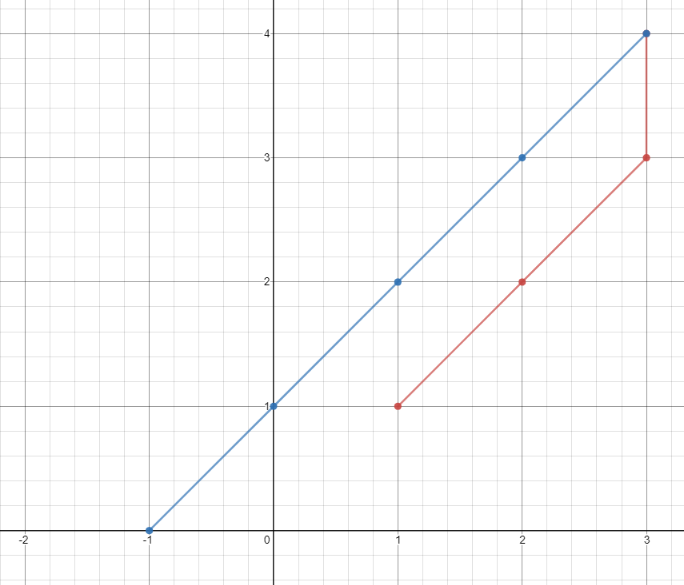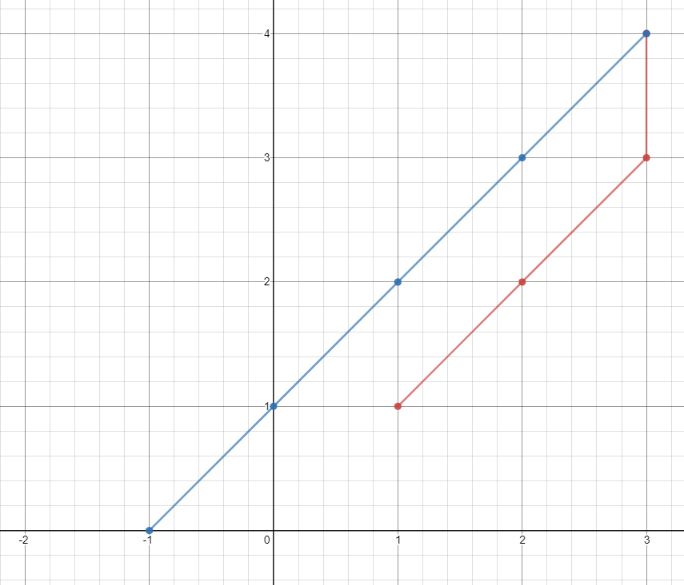原文链接: https://leetcode-cn.com/problems/minimum-time-visiting-all-points
英文原文
On a 2D plane, there are n points with integer coordinates points[i] = [xi, yi]. Return the minimum time in seconds to visit all the points in the order given by points.
You can move according to these rules:
- In
1second, you can either:<ul> <li>move vertically by one unit,</li> <li>move horizontally by one unit, or</li> <li>move diagonally <code>sqrt(2)</code> units (in other words, move one unit vertically then one unit horizontally in <code>1</code> second).</li> </ul> </li> <li>You have to visit the points in the same order as they appear in the array.</li> <li>You are allowed to pass through points that appear later in the order, but these do not count as visits.</li>
Example 1:

Input: points = [[1,1],[3,4],[-1,0]] Output: 7 Explanation: One optimal path is [1,1] -> [2,2] -> [3,3] -> [3,4] -> [2,3] -> [1,2] -> [0,1] -> [-1,0] Time from [1,1] to [3,4] = 3 seconds Time from [3,4] to [-1,0] = 4 seconds Total time = 7 seconds
Example 2:
Input: points = [[3,2],[-2,2]] Output: 5
Constraints:
points.length == n1 <= n <= 100points[i].length == 2-1000 <= points[i][0], points[i][1] <= 1000
中文题目
平面上有 n 个点,点的位置用整数坐标表示 points[i] = [xi, yi] 。请你计算访问所有这些点需要的 最小时间(以秒为单位)。
你需要按照下面的规则在平面上移动:
- 每一秒内,你可以:
- 沿水平方向移动一个单位长度,或者
- 沿竖直方向移动一个单位长度,或者
- 跨过对角线移动
sqrt(2)个单位长度(可以看作在一秒内向水平和竖直方向各移动一个单位长度)。
- 必须按照数组中出现的顺序来访问这些点。
- 在访问某个点时,可以经过该点后面出现的点,但经过的那些点不算作有效访问。
示例 1:

输入:points = [[1,1],[3,4],[-1,0]] 输出:7 解释:一条最佳的访问路径是: [1,1] -> [2,2] -> [3,3] -> [3,4] -> [2,3] -> [1,2] -> [0,1] -> [-1,0] 从 [1,1] 到 [3,4] 需要 3 秒 从 [3,4] 到 [-1,0] 需要 4 秒 一共需要 7 秒
示例 2:
输入:points = [[3,2],[-2,2]] 输出:5
提示:
points.length == n1 <= n <= 100points[i].length == 2-1000 <= points[i][0], points[i][1] <= 1000
通过代码
高赞题解
方法一:切比雪夫距离
对于平面上的两个点 x = (x0, x1) 和 y = (y0, y1),设它们横坐标距离之差为 dx = |x0 - y0|,纵坐标距离之差为 dy = |x1 - y1|,对于以下三种情况,我们可以分别计算出从 x 移动到 y 的最少次数:
dx < dy:沿对角线移动dx次,再竖直移动dy - dx次,总计dx + (dy - dx) = dy次;dx == dy:沿对角线移动dx次;dx > dy:沿对角线移动dy次,再水平移动dx - dy次,总计dy + (dx - dy) = dx次。
可以发现,对于任意一种情况,从 x 移动到 y 的最少次数为 dx 和 dy 中的较大值 max(dx, dy),这也被称作 x 和 y 之间的 切比雪夫距离。
由于题目要求,需要按照数组中出现的顺序来访问这些点。因此我们遍历整个数组,对于数组中的相邻两个点,计算出它们的切比雪夫距离,所有的距离之和即为答案。
[sol1]class Solution { public: int minTimeToVisitAllPoints(vector<vector<int>>& points) { int x0 = points[0][0], x1 = points[0][1]; int ans = 0; for (int i = 1; i < points.size(); ++i) { int y0 = points[i][0], y1 = points[i][1]; ans += max(abs(x0 - y0), abs(x1 - y1)); x0 = y0; x1 = y1; } return ans; } };
[sol1]class Solution: def minTimeToVisitAllPoints(self, points: List[List[int]]) -> int: x0, x1 = points[0] ans = 0 for i in range(1, len(points)): y0, y1 = points[i] ans += max(abs(x0 - y0), abs(x1 - y1)) x0, x1 = points[i] return ans
复杂度分析
时间复杂度:$O(N)$,其中 $N$ 是数组的长度。
空间复杂度:$O(1)$。
统计信息
| 通过次数 | 提交次数 | AC比率 |
|---|---|---|
| 30358 | 36825 | 82.4% |
提交历史
| 提交时间 | 提交结果 | 执行时间 | 内存消耗 | 语言 |
|---|




